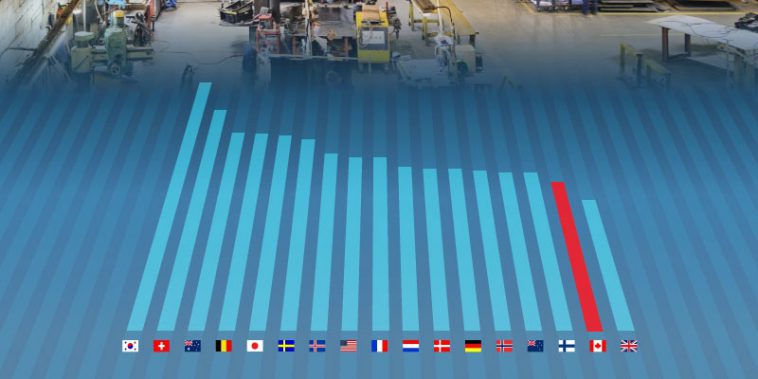
by Philip Cross, Senior Fellow, Fraser Institute
Summary
- This bulletin provides an overview of business investment in Canada: why investment is important, its recent performance, and how it compares with other industrialized countries.
- Business investment is central to long-term economic growth and rising living standards. Investment is also an important determinant of the structure of industry growth in future years, since it provides the capital for firms to grow. Investment embodies new technological developments and innovations, committing firms to expand in a specific direction while providing the tools for employees to work more productively.
- There is a tendency to assume that the weakness in business investment in Canada is simply part of slow growth throughout the OECD following the financial crisis that began in 2008. However, despite strength in the energy sector before 2015, business investment in Canada has lagged behind that in almost all other advanced market economies for which there is comparable data.
- Indeed, business investment in Canada has been relatively low compared to other countries at least since 2000. It improved somewhat between 2009 and 2014 when strength in our energy sector boosted our relative performance. However, the underlying weakness of investment in Canada became apparent again after oil prices slumped, ending the boom in energy investment.
- The persistent weakness of business investment in Canada has been aggravated by several recent government policies including increased tax rates on capital and mounting budget deficits and debt, both of which add to the uncertainty that entrepreneurs and investors feel about the future.
Business investment in Canada second-lowest among 17 advanced economies; holding back economic growth, higher living standards
October 12, 2017
OTTAWA—Canada lags far behind other developed countries when it comes to business investment, which is critical to grow the economy and increase living standards, finds a new study released today by the Fraser Institute, an independent, non-partisan Canadian public policy think-tank.
“When businesses invest in the latest technologies and production techniques and expand their operations, it spurs economic growth and raises living standards for workers,” said Philip Cross, former chief economic analyst for Statistics Canada and author of Business Investment in Canada Falls Far Behind Other Industrialized Countries.
The study finds that Canada has suffered persistently weak levels of business investment—money firms spend on buildings, machinery and equipment, research and development—since at least 2000.
The last energy boom temporarily masked Canada’s low levels of investment in other industries, but since the fall of energy prices in 2014, business investment in Canada is back to previously low levels. In fact, since the end of the third quarter of 2014, business investment in Canada has declined a staggering 18 per cent (after accounting for inflation).
Crucially, Canada has one of the lowest levels of business investment among 17 developed countries in the Organisation for Economic Co-operation and Development (OECD).
Business investment as a share of GDP (that is, business investment relative to the overall size of the economy) between 2015 and this year is projected to be just 10.9 per cent in Canada—the second lowest among the 17 countries—compared to, for example, South Korea (21.3 per cent), Australia (15.7), Sweden (15.0) and the U.S. (13.3).
And Canada ranks 15th out of 17 in business investment per worker at just $9,290 compared to, for example, Switzerland ($17,423) and the U.S. ($14,889). Put differently, Canadian workers have just 62 per cent of the capital available to them that American workers do.
“With low levels of business investment compared to other developed countries, Canadian workers do not have access to the tools and technology they need to be more productive and earn higher incomes,” Cross said.
“The factors affecting business investment are complex, but governments across Canada have aggravated the problem in recent years with an onslaught of economically damaging policies such as higher taxes, costly regulations and increased uncertainty about future taxes by adding billions in debt.”
About The Fraser Institute
Their mission is to improve the quality of life for Canadians, their families, and future generations by studying, measuring, and broadly communicating the effects of government policies, entrepreneurship, and choice on their well-being.
Headquartered in Vancouver, Canada, the Fraser Institute has regional offices in Calgary, Toronto and Montreal. We produce research about government actions in areas that deeply affect Canadians’ quality of life such as taxation, health care, aboriginal issues, education, economic freedom, energy, natural resources and the environment.


